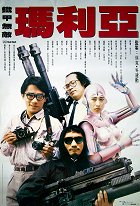Réalisation:
David ChungScénario:
Kai-Chi YuenPhotographie:
Wan-Shing LoActeurs·trices:
Hark Tsui, John Sham, Sally Yeh, Dennis Chan, Kirk Wong, Tony Chiu-wai Leung, Paul Chun, Ching-Ying Lam, Ernest Mauser, Ben Lam, Kong To-Hoi (plus)Résumés(1)
In the new age of highly developed technology, Apollo Gang plans to take over the city by the giant robots. The police are incompetent but just to find scapegoats: the reporter Ching, ex-armament officer Mo and ex-member of the Gang A1. Maria, a beautiful robot, is sent by the Gang to kill them but fails. Accidentally, Maria is connected to Mo's computer databank and can think and act like human. She becomes their partner instead of enemy. (texte officiel du distributeur)
(plus)Critiques (1)
Tsui Hark’s work as a director and producer, at least from the key period of Hong Kong’s colonial era, stands on a foundation comprising a mix of formulas and revisionist revival of traditional Chinese genres and their intermingling with western influences. At the same time, his work is characterised by creative tinkering (in terms of craft and form, as well as purely implementational and childish) and emancipatory tendencies, when Tsui simply wanted to bring his own versions of western trends and genre milestones to cinema in his homeland. In the same year when the Tsui-produced Gunmen, a variation on De Palma’s post-modern gangster movie The Untouchables, was released to cinemas, his quite possibly most eclectic work, whose mishmash of styles and genres may be equalled only by his fantastic debut, The Butterfly Killers, also excelled on local screens. I Love Maria, also known as Roboforce, is an absolutely incongruous extravaganza in which special effects play the lead role over any sort of screenwriting logic or causal structure in the context of the otherwise very vague narrative standards of the Hong Kong mainstream. Everything here is subordinate to the ambition to let viewers constantly marvel at something while concurrently entertaining them. This refers not only to the special effects, but also to how the film’s sequences are interconnected (or disconnected), how strikingly effectively the characters move from one place to another, and how their relationships and plot twists are revealed completely randomly. And there truly is something to marvel at – at least for those with a properly open mind – because Tsui combines his adoration for Fritz Lang’s sci-fi classic Metropolis and Japanese tokusatsu films with the tradition of Chinese wu-xia stories and modern popular comedies, while not shying away from adding in particular inspirations from contemporary Hollywood blockbusters (from the dynamics of Back to the Future and the technological excesses of The Delta Force to the tumult of the Aliens soundtrack). With undisguised enthusiasm for the project as a producer, Tsui gets carried away with his vision of a futuristic world in which robots become new variants of superhuman wu-xia warriors flying through the air and deflecting bullets instead of punches. Tsui’s team enthusiastically embraces the production limitations and turns them into strengths in the interest of a delightfully naïve and purposefully inventive rendering. The futuristic metropolis thus helps to evoke a combination of rather anonymous locations and industrial settings shrouded in a blanket of artificial fog. The spectacular visual impression of the sci-fi technologies is similarly aided by smoke, steam and darkness together with fragmented shooting and comic-bookishly skewed camera angles. Unlike the contemporary film’s by Steven Spielberg (to whom Tsui was often compared in an effort to give western viewers an idea of his influence and creative ambitions), I Love Maria does not strive for sophistication and believability, which would have legitimised its fantastical nature in the eyes of adult viewers. Rather, it dispenses with clever tricks that would blur the line between fiction and fantasy, and conversely revels in the papier mâché extravagance with childlike joy. The essence of this is the giant robot, which renders the rockets launched at it harmless by opening a small door in itself to a miniature furnace, where it lets the rockets explode and then expels the resulting scrap metal from its backside like droppings. The verbal and slapstick tomfoolery is in a similar vein and is present only in the original Hong Kong version, because it was a bit too much for foreign markets. On the other hand, the film’s revenues indicate that this phantasmagorical sci-fi extravaganza did not entirely connect with the domestic audience. However, that doesn’t change the fact that I Love Maria is one of the most amazing, most original and most entertaining entries in Tsui Hark’s filmography.
()
(moins)
(plus)

